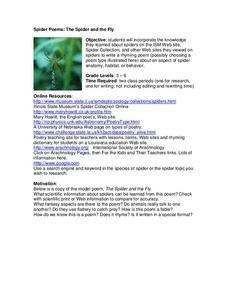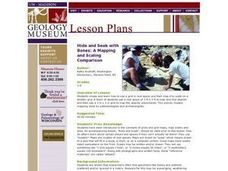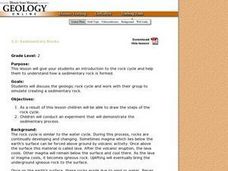Curated OER
Physical Adaptations in Ice Age Mammals
Students identify the body parts in Ice Age mammals that allowed them to survive. They answer questions as a class and discuss. They examine photographs of the animals as well.
Curated OER
The Spider and the Fly
Students incorporate the knowledge they learned about spiders on the ISM Web site, Spider Collection, and other Web sites they viewed on
spiders to write a rhyming poem (possibly choosing a poem type illustrated here) about an aspect of...
Curated OER
Dinosaur Prints
Students examine dinosaur footprints and compare them to the shape of elephant footprints and to the size of their own footprints.
Curated OER
What Big Teeth You Have:
Students make their own tooth impressions of a sharp and a flat tooth and compare the differences. They make impression of fossil teeth from dinosaurs comparing the sharp and flat teeth and learning about their uses.
Curated OER
Footprint Detectives: Making Inferences Using Dinosaur Trackways
Young scholars analyze and discuss footprints and dinosaur tracks. They listen to books about paleontologists, create and analyze their own trackways using black paper and chalk, examine the data, and form hypotheses about footprints and...
Curated OER
Hide and Seek with Bones: A Mapping and Scaling Comparison
Students examine and simulate how paleontologists map objects. They hide and find objects using a grid to map the objects' placements.
Curated OER
Animal Tracks - Walking and Running
Students, using paper and water, make tracks and record the time needed to make them. They compare tracks made walking and running to determine the speed of the animal.
Curated OER
Designasaurus: Modeling Activity for a Paleoartist
Students create and draw fictional dinosaurs. They write a description of their dinosaur.
Curated OER
A Lab Demonstration: Three dimensional view of soft internal structures of bony material
Students discuss the structures of a bone and observe a demonstration of bony materials.
Curated OER
A Phylogenetic Perspective for the Cladistically Challenged
Students use M&Ms to simulate radioactive decay of elements.
Curated OER
WPA Art and Visual Elements of Art
Students recognize the following formal elements om art: visual and tactile texture; shape or contour; value. They create a 2-D or 3-D work of art that embodies this element strongly.
Curated OER
Creating a Leaf Collection and Classroom Herbarium
Students categorize leaves they collect from trees outdoors by consulting a variety of sources. They discuss how the form of a leaf reflects its adaptation to its environment.
Curated OER
USING THE SOFTWARE PROGRAM "HYPER-STUDIO"
Students demonstrate the steps to follow in using the software to create a presentation. They use context of cultural history of the four periods of Native American lifestyles in Illinois and create a presentation.
Curated OER
City Desk with Malcolm X
High schoolers view a film about civil rights and the role Malcolm X played in the civil rights movement. They create a timeling about the events that occured from segregation to integration. They discuss discrimination as well.
Curated OER
Forward March: Continuing Frederick Douglass' Footsteps
Middle schoolers view numerous artifacts from the life of Frederick Douglass. Using the objects, they discover the many parts of his life and develop a hypothesis about the significance of the objects in his life. They identify the...
Curated OER
Ethnic Groups in World War II
Students understands important issues, events and individuals of the 20th Century and can summarize the contributions of people of various racial and ethnic groups in the development of Texas and the United States.
Curated OER
Pacific War Timeline
Students apply chronlogy through the sequencing of significan events from World War II in the Pacific. They draw a timeline by making a straight line and marking a place for every year from 1937-1945. During the visit to the George Bush...
Curated OER
The Role of Geography -- The United States and the Republic of Turkey
Preteens review the five themes of geography. In groups, they examine the United States and Turkey to discover how geography can impact the way people live. They create a foldable for each country, listing information for each of the...
Curated OER
Side by Side: Butterfly Wings and Symmetry
Students observe butterfly images and then draw and paint their own design. They use this activity to explain symmetry.
Curated OER
Harvesting the River Lesson Plan: Taking an Oral History
Students practice researching history through oral traditions. In this U.S. History lesson plan, students examine an online exhibit titled Harvesting the River, in which students interview someone from the story. Students...
US Holocaust Museum
Time Capsule in a Milk Can
Imagine dumping out a milk can and finding letters from one of the darkest moments in history! Scholars use Holocaust Reading Passages and research to discover how people recorded and hid history during the events of World War II. They...
Curated OER
A Vist to Manassas
Fifth graders appreciate the scope of a Civil War battle. They will see the perspectives of soldiers from both the North and the South.
Curated OER
2.2: Sedimentary Rocks
Second graders discuss the geologic rock cycle and work with their group to simulate creating a sedimentary rock. They conduct an experiment that demonstrates the sedimentary process and draw the steps of the rock cycle.
Curated OER
Weaving with Seed Beads on a Bead Loom
Young scholars describe, and try, the process of weaving and demonstrate how Native Americans and others wove beads on a loom to create long, narrow bands for hair and bracelets.
Other popular searches
- Museums and Exhibits
- History of Science Museums
- Online Museums
- History Museums
- Children's Museums
- Science Museums
- Childrens Museums
- Art Museums
- Museum Directories
- +Childrens +Museum
- On Line Museums
- Museums of History























